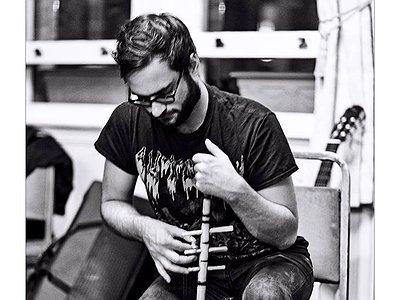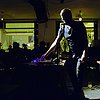Name: Robbie Judkins / Left Hand Cuts off the Right
Occupation: Sound artist / musician
Current Release: Axing Body on Box Records
Recommendations: Tasos Stamou and Marlo Eggplant
Website: If you enjoyed this interview with Robbie Judkins, you can find more information about him on his Bandcamp page or Facebook profile.
When did you start writing/producing music - and what or who were your early passions and influences?
I started playing around with music software when I was around 12 - looping and creating tracks from pre-existing samples. I also learnt the clarinet at a young age and then later the piano. But when I got to around 15/16 I became obsessed with punk and metal as well as breakcore, gabba and jungle. I was equally enthused and inspired by Erik Satie, Philip Glass, Napalm Death, Fugazi and Venetian Snares at this time.
For most artists, originality is first preceded by a phase of learning and, often, emulating others. What was this like for you? How would you describe your own development as an artist and the transition towards your own voice?
I don’t think that development has finished as I’m still learning. However, there are certain artists and pieces that have really stuck with me and who I will constantly stream inspiration from. Emulating pieces, textures and sounds by Ashtray Navigations, Black to Comm, Robert Turman, Eliane Radigue and Hive Mind will always be apparent in what I do with Left Hand Cuts off the Right. I still strive to combine noise, drone, animal sounds, melody and rhythm together when I compose and perform.
What were your main compositional- and production-challenges in the beginning and how have they changed over time?
I have a basic understanding of harmony and melody but found it the most frustrating element of learning and composing music when I was young. However, I am grateful for what I have learnt. I have also had little money most of my adult life so I would always make do with whatever materials, instruments and equipment I had to hand. I appreciate this limitation though as I’ve learnt to push and test myself with the materials I have. I taught myself to record and edit audio and I’ve found ways that work for me. However, I would love to learn more and I’m sure my methods aren’t very orthodox or professional.
Tell us about your studio, please. What were criteria when setting it up and how does this environment influence the creative process? How important, relatively speaking, are factors like mood, ergonomics, haptics and technology for you?
I sadly don’t have my own studio as I am unable to afford one. My band Casual Sect does share a practice room with other bands which I love having use of. I make time and space to compose and record at home. One day maybe I’ll have a space of my own. Sadly, London is very expensive and makes life difficult for artists.
What are currently some of the most important tools and instruments you're using?
I love playing the zeze and zither when composing and performing. I don’t play these in traditional ways but I have found techniques that work for me and that I find satisfying. I still use a Weevil (circuit bent oscillator) for most of my performances, as well as tape loops, delay pedals and hand percussion.
Many contemporary production tools already take over significant parts of what would formerly have constituted compositional work. In which way do certain production tools suggest certain approaches, in which way do they limit and/or expand your own creativity? Are there any promising solutions or set-ups capable of triggering new ideas inside of you as a composer?
I try not to rely too much on technology or software to compose, at least to begin with. I often start by playing or improvising with an instrument, some effects or an electronic device and then record to Adobe Audition or my tape recorder and it’s from there that I make use of the tools available on these recording devices. This is often where the composition develops as a conversation between the technology and my own playing. I hope to learn some new programmes and expand my possibilities also.
Could you describe your creative process on the basis of a piece or album that's particularly dear to you, please? Where do ideas come from, what do you start with and how do you go about shaping these ideas?
Axing Body is an album that means a lot to me. I have been composing and improvising during times of difficulty with depression and anxiety. The physical act of playing music and feeling immersed in composing and developing a piece have been effective forms of therapy for me. I see this album as an expression of my difficulties and a release from them.
I started by improvising on the piano - finding tone clusters, keys or series of notes and chords. I started to play with a tone cluster and created a melody line that I as happy with and looped this. I like to create then 2 or 3 lines that run alongside the first and these are often recorded at different speeds and lengths to the first - so repetitions feel familiar but they often slip in and out of time with each other.
On some tracks I slightly altered the speed and pitch of the original recordings. I will often pick out specific high or low frequencies from some of the raw recordings and EQ them, adding reverb or any slight tweaks to enhance them. These are often looped and I play around with the volume of the various tracks that then informs the structure of the piece.
On some of the tracks I have added layers of zeze and loops from found objects to add extra dirt to the pieces. Opinions from a fresh set of ears from a person not directly involved in the recording is always helpful. I then may add or take away whole sections, effects or lines until I am happy with the final pieces.



